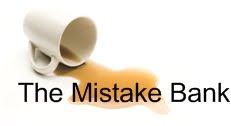Here's my yearly "best of" list. It's been a great year for mistake books, as you can tell by the Bookshelf feature we've done the second half of the year. I'd like to thank everyone who suggested books and ask you to please keep the suggestions coming. As always, these are books I read this year - some were published before 2013.

1.
Antifragile: Things That Gain from Disorder, Nassim Nicholas Taleb. At times long-winded, petty and vindictive, it has also got more vital, energizing ideas in one chapter than most great books contain in their entirety. Read this book, and you will appreciate all the more why economists cannot be trusted with the economy, the many ways in which philosophy trumps science, and the wide applicability of the "
turkey problem." (Yes, think Thanksgiving.)
2.
 The End of Competitive Advantage: How to Keep Your Strategy Moving as Fast as Your Business
The End of Competitive Advantage: How to Keep Your Strategy Moving as Fast as Your Business, Rita Gunther McGrath. A great synthesis of trends that have been emerging for the past two decades, McGrath demonstrates how many of the core assumptions of Michael Porter-style strategic thinking (industry-based competition, the idea of long-term competitiveness, etc.) are now outmoded, and competitiveness now means the ability to nimbly discover, exploit, and move on from briefer periods of advantage.
3.
The Logic Of Failure: Recognizing And Avoiding Error In Complex Situations by
Dietrich Dörner. Written and published in the 1990s, this is a terrific and compassionate look at how people are befuddled by complex problems - those with many contributing factors, side effects, and time lags between cause and effect - and how we can learn to manage these problems better. For example, think before you act, make small changes, and carefully track results.
4.
Intuition Pumps And Other Tools for Thinking, Daniel C. Dennett. A huge book with all sorts of tools to help people find their way around intellectual problems. My favorite tool is the first: Making Mistakes.
5.
What I Learned Losing a Million Dollars (Columbia Business School Publishing) Jim Paul and Brendan Moynihan. Very few types of work are as rich a source for mistake stories as investing. In this human, funny and compassionate work, Paul recalls his rise in prominence as a commodities investor, and then his rapid fall. In the second half of the book, he dissects his decisions and discusses the psychological factors that helped them go so wrong. [This was one of the many interesting books recommended by Taleb in Antifragile.]
And may I present one more item for your holiday shopping consideration? Contact me at mistakebank (at) caddellinsightgroup (dot) com for bulk pricing on the paper edition.






